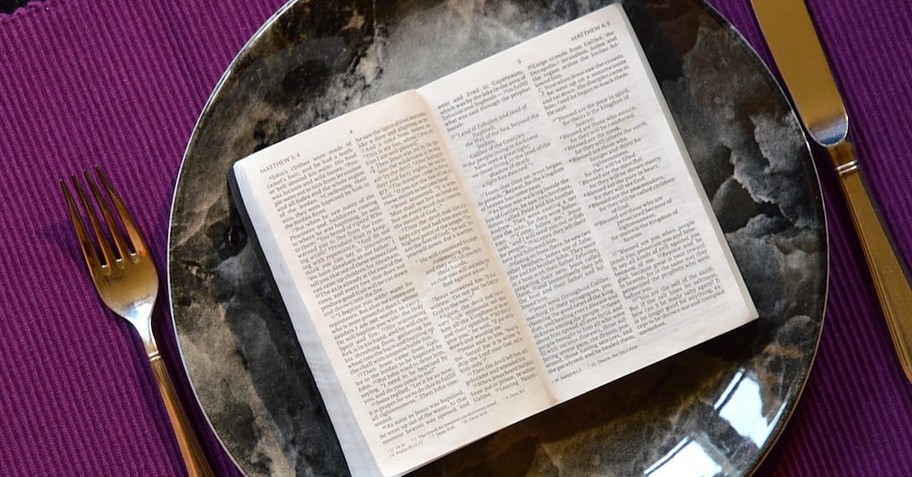5 Ways Jesus' Lifestyle Can Help You Thrive in Quarantine

Our town was an early adopter of a stay-at-home order for all non-essential businesses. Because I work from home anyway, life shouldn’t have changed much for me. But it has.
Now I’m not the only person in the house all day, and distractions abound. The news cycle leaves me unsettled, and cooking all our meals at home is time-consuming. For the most part, even with all these changes, I do okay during the daylight hours. However, when the sun goes down, so does my positive outlook.
I couldn’t sleep last night. New guidelines suggesting the need to remain quarantined at least another whole month quashed my hopes of a quick return to “normal” life. All the worst-case scenarios of the coronavirus pandemic played through my mind, along with a creeping mental darkness.
So I did what I always do when fears assault me—I called out the name of Jesus into the airspace of my bedroom. Within minutes, I drifted off.
This morning I woke with this thought: If just mentioning Jesus’s name aloud has such power, why not see what we can learn about His daily life practices and imitate them as we cope with the virus and our mandated quarantine?
Jesus lived in turbulent times. Revolution simmered just under the surface of everyday life.
The Jews lived in their homeland, but they suffered under the tyranny of Roman-appointed governors, unable to rule themselves. Poverty was rampant, due at least in part to high taxes and graft among officials.
Jewish religious leaders carried some clout, but even they were corrupt. In the midst of these difficult constraints, Jesus lived a life of calm serenity and became a ray of hope in otherwise dark days.
He was the Son of God, and His divinity made Him the Light of the world, but how did He live that out—what did Jesus do every day that made a difference in His human life, and for the people around Him? These are the things we can do, too.
Photo Credit: ©GettyImages/KristiLinton

1. Jesus Prayed Daily
There are two aspects of Jesus’s personal prayer life that stand out to me. The first is that He found ways to be alone.
Many times, the biblical authors recorded Jesus going off by Himself to pray. During a quarantine, when your house may be teeming with your kids and spouse who are all there all the time, you may wonder how you can be alone for even a minute.
My solution is to hibernate in the bathroom, or a walk-in closet. But the next thing we notice about Jesus will help, too.
The other aspect of Jesus’s devotions was the time of day He chose for them. Early mornings—often pre-dawn—found Him outside town, lifting His voice to the Heavenly Father.
Maybe in order to find the solitude you seek, imitating this one thing can solve your dilemma. Rising at least a half hour before anyone else in the house offers peace and quiet that may not happen again until after the last family member retires at night.
By that time, if you’re like me, exhaustion from coping with all the new and different routines and demands takes over and I’m unable to utter a coherent sentence, let alone a prayer. Mornings definitely offer an advantage—just make a big pot of coffee and play some worship music on your phone.
Gather your Bible and journal and head to your chosen spot. Your Heavenly Father will meet you there.
Photo Credit: ©Unsplash/nega

2. Jesus Met the Physical Needs of Others
Jesus was others-focused. He spent his days and evenings surrounded by people, meeting their needs.
One of the more famous stories about Him is recorded in all four gospels. Jesus had been teaching a crowd of 5,000 men, plus women and children all day. By evening, they were hungry, so He fed them with five loaves of bread and two fishes.
There was a lot more to this miracle than merely feeding a hungry crowd. By doing so, He was able to make the larger point of His identity and life purpose.
In another instance, Jesus fed a different crowd, and in yet another, He gathered grain for his disciples. Even if He didn’t need food, He made sure those around Him ate.
We can make sure the hungry around us eat, too. I’m so encouraged by all the creative ways springing up to get food to the needy that I see on the news and social media.
We can participate in those efforts and our own. If your neighbor can’t go grocery shopping, do it for her. If you know someone who lost his job in the service industry, pick up extra items for him the next time you shop for your family and call to tell him you’re leaving them on his porch.
Bake an extra batch of cookies and take them to a mom you know with kids at home.
One of my friends called me up the other day and said she was driving down my street, and asked if I could come out to the mailbox. I grabbed my shoes, curiosity nipping at my heels.
She pulled up and the driver’s side window slid down, revealing her face swathed in a brightly-colored homemade mask.
She dangled a small gift bag from her fingers. “This is for you. I was just thinking about you and wanted you to know,” she said. Back inside my kitchen, I opened it to find a lemon-poppyseed loaf from a local bakery and a sweet note.
Jesus' ministry also focused on healing.
Jesus was divine, and He healed by the power of God. But right now, during the pandemic, He is using people and medicine to bring healing to the desperately ill.
Nurses and doctors giving unselfishly—even to the point of their own lives—make the news every day. If you are one of these caregivers, you are an angel in disguise.
If you are a Christian in the health professions, offering healing along with the name of Jesus can make an eternal difference. Franklin Graham’s organization, Samaritan’s Purse, does this on a large scale by sending teams into disease-ravaged areas to bring the physical and spiritual healing of Christ.
The United States military hospital ships and the Army Corps of Engineers-built temporary hospitals don’t just happen. People sacrifice their safety to work on these projects.
Those of us outside the medical field can aid by making masks and dropping off food for first responders. We can join our neighbors in posting signs expressing our gratitude for their service.
And if one of our family becomes ill, we can care for them while they isolate at home with utmost attention to the extra hygiene required. We can offer tenderness and love along with Tylenol, disinfectant, and clean pajamas.
Photo Credit: ©GettyImages/Tatiana Atamaniuk

3. Jesus Talked to People
Many times in the Bible, we read about Jesus entering long discourses with folks who previously failed to understand Him. His verbal sparring with the religious leaders is legendary.
But what speaks to me is noting all the times when Jesus sat over dinner and discussed important topics. After He met Zaccheus, He told Zaccheus to gather his friends and associates for dinner.
Over the meal, He filled in all the gaps in their understanding of what it meant to know and follow God. He often stayed in Bethany at the home of Mary, Martha, and Lazarus. There, Mary oversaw meal preparations for the neighbors who consistently gathered to eat and visit with Jesus
We can’t gather with friends over dinner in person, but the internet age allows us to gather by video chat. I have a friend who, together with his wife, played a game of Farkle one evening with her parents through FaceTime. Later, they arranged a Zoom call with extended family.
A good old-fashioned phone call with earphones can become a priceless tool for keeping in touch.
One of my sons finds himself on daycare duty of his 18 month-old son for half the day while his wife works from home. Stroller walks outside have become his go-to opportunities to call me or his dad and visit about both lighthearted subjects and the more serious aspects of life.
If you have children in your home, you can turn meal-time into discussion time. By engaging in the normal activity of eating while they talk, kids may be more apt to open up about the things that concern them. After the kids go to bed, take some time for conversation with your spouse. Share your worries and pray together
Photo Credit: ©GettyImages/Prostock-Studio

4. Jesus Fasted
Fasting isn’t a popular subject for most people to talk about, especially in America. But Jesus practiced fasting. He spoke to his disciples with the assumption that they did, too, when he said in Matthew 6:16 and 17, “When you fast…”
We tend to think we’re missing vital nutrition if we go more than a few hours without food. However, Jesus knew what scientists are learning now—fasting has real, lasting health benefits.
At about the 24-hour mark, the body begins to slough off old, dead cells in greater numbers. The practice of fasting for two 24-hour periods in each week—called intermittent fasting—is gaining popularity as a means of weight loss. Those who do it claim increased mental clarity and boundless energy as an added result.
Another method of gaining similar results is to fast overnight each night for 16 to 20 hours, depending on what seems to work out best for an individual.
During the fasting hours, blood sugar and insulin levels normalize. I have discovered that intermittent fasting helps me focus and offers a framework, or schedule, for eating that regulates my days at home.
Besides providing mental sharpness, this practice unleashes spiritual power. Jesus, in answer to his disciples question about their inability to cast out a particular demon, said, “This kind can be cast out only by prayer and fasting” (Mark 9:29).
Early missionaries Paul and Barnabas prayed and fasted each time they appointed elders upon leaving a new church plant (Acts 14:23). And of course, Jesus fasted for 40 days in the wilderness just before beginning His early ministry.
In these crazy, unprecedented times, fasting while praying may accomplish far more than we could ever dream. We can ask God to end the scourge, and also to use it to bring many souls to Christ. We can also ask Him to do a work in us that will leave permanent results.
So, consider fasting as an aid to your spiritual journey, for physical health, and as a tool for ending the mindless snacking we’re all tempted to do while cooped up at home.
Photo Credit: ©GettyImages/RoterPanther

5. Jesus Exercised and Ate Clean, Whole Foods
Okay, He didn’t spend an hour a day in the gym, but Jesus walked everywhere He went. Yes, it was the custom of the day—one we would do well to emulate.
If your quarantine allows, go outside for a one- or two-mile walk every day. Otherwise, jog in a circuit through the living room and down the hall, walk on a treadmill if you have one, or make extra trips up and down the stairs in your home if it is more than one level.
At the very least, execute over-sized stepping forward, backward, and sideways while pumping your arms in the air. You might look strange, but you’ll feel much better afterward. Aerobic exercise releases endorphins, the “feel-good” hormones, that help maintain our mental health.
The food available to the people in Jesus’s day was unprocessed, whole food. It came directly from the fields, flocks, and lakes and provided dense nutrition in every bite.
We’ll be healthier, with stronger immune systems if we eat this way, too. I’ve discovered on my forays to the grocery store that dry, whole grains and beans and fresh vegetables are not what’s disappearing from the shelves.
I might not be able to buy meat, but I can make filling, nutritious meals from these other items with a little help from recipes on Pinterest.
We always knew Jesus is our spiritual example. Now we have seen how his daily life practices can be an inspiration for our own difficult days. Let’s follow Him and shine His light in the darkness surrounding us.
Kathryn Graves, author of Woven: Discovering Your Beautiful Tapestry of Confidence, Rest, and Focus, and Fashioned by God, holds a BA in Psychology, is a pastor’s wife and Bible teacher, and spent 15 years in the fashion industry. Kathryn is Mimi to four grandsons, and loves to play with color—including interior design, clothing, and painting with pastels. In addition to her website, find her on Facebook, Instagram, and Twitter.
Photo Credit: ©Unsplash/Daniel Agudelo
Originally published April 03, 2020.








